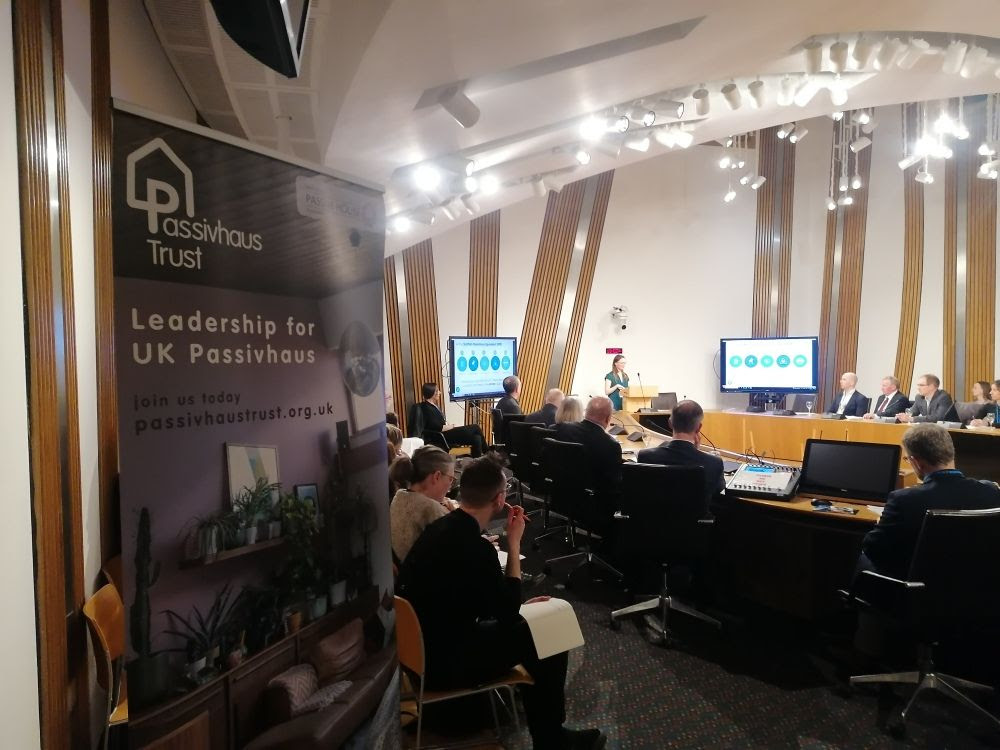Next steps for Scottish Passivhaus equivalent discussed at Holyrood

Alex Rowley MSP
A recent MSP reception was held at the Scottish Parliament aimed at exploring the next steps for the proposed Scottish Passivhaus equivalent legislation.
Sponsored by Alex Rowley MSP, the reception on 28 February was attended by MSPs from across the political spectrum, including minister for housing Paul McLennan, as well as representatives from Scotland’s construction industry. The event was hosted by the UK Passivhaus Trust and Built Environment - Smart Transformation (BE-ST) and included talks, films and a chance for MSPs and attendees to ask questions about Passivhaus and the Scottish equivalent proposals.
In January 2023, the minister for zero carbon buildings, active travel, and tenants’ rights, Patrick Harvie MSP, announced the Scottish Government’s intention to introduce Passivhaus equivalent energy efficiency targets into Scotland’s building standards. The policy for ultra energy efficient newbuild housing goes out to consultation in summer 2024 and is due to be adopted as legislation in December 2024.
Passivhaus is the leading international low energy building standard. Modelling undertaken for the Passivhaus Trust has shown that the Passivhaus standard reduces heating demand in homes by 79% compared with current Scottish building regulations (Section 6 2023).
Alex Rowley, Scottish Labour MSP for Mid Scotland and Fife, is a long-term supporter of the Passivhaus standard. His member’s bill, the Proposed Domestic Building Environmental Standards (Scotland) Bill, formed the basis of the policy adopted by the Scottish Government. Alex Rowley developed the Bill in response to the Scottish Climate Assembly’s 2021 Recommendations for Action, in which 97% of the Assembly voted in favour of the Passivhaus or Scottish equivalent standard for new build projects in Scotland. A consultation on the proposed Bill was undertaken during 2022, with the majority of all responses (over 90%) supportive of the proposal.
Alex Rowley MSP said: “The Passivhaus equivalent policy offers a long-term ‘spend to save’ approach that will help address Scotland’s fuel poverty crisis, help future-proof housing stock, and tackle our climate emergency. It was fantastic to bring together fellow MSPs, local authorities, housing associations and representatives from the Scottish construction industry to explore positive ways to take the policy forward.”

The event also saw the Passivhaus Trust set out its vision for how the Passivhaus equivalent policy could be delivered in Scotland. Encompassing timescales, targets, certification and verification and training needs, the Passivhaus Trust will be publishing a detailed breakdown of its recommendations in March 2024.
Sarah Lewis, research & policy director at the Passivhaus Trust, said: “We have been impressed with the can-do attitude of the construction industry involved in delivering Passivhaus schools in Scotland. It is clear that Scotland is up to the challenge of the Scottish Passivhaus equivalent and we have identified many ways that we can support the Scottish construction industry through that transition”.
Caitriona Jordan, head of retrofit programmes at BE-ST, added: “To deliver the Scottish Passivhaus equivalent, Scotland will need to upscale training of the construction industry and at pace. We can do this! Since March 2021 we’ve upskilled over 3000 people in Passivhaus standards and the fabric-first approach. It is possible to close the skills gap, train the workforce in Passivhaus and meet the needs for implementation of the new building regulations at scale. BE-ST will be ready to help make that happen.”
Stewart Macleod, managing director – property at AtkinsRéalis, said: “I think the Scottish Government’s adoption of the Passivhaus equivalent is brilliant. It is forward-looking and will be a key part of Scotland tackling the built environment’s climate challenge. It is also going to reduce the energy consumption costs for the new households, helping with the cost of living crisis. I think it’s something we can be immensely proud of in Scotland.”
Allan Smith, low carbon manager at Morrison Construction, added: “We welcome the Scottish Government’s commitment to Passivhaus and low carbon construction and that a clear direction of travel is being set. The Scottish construction industry is already rising to the challenge, but we are only in the early stages of this journey and as we continue to progress we will see more and more benefits as our supply chain adjusts and responds accordingly.”























